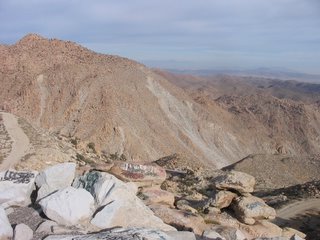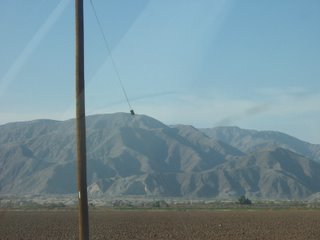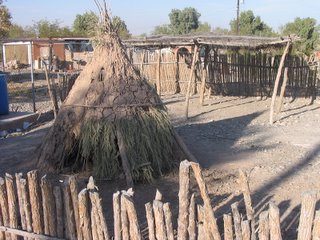 From the top of the pass
From the top of the pass From the Colorado River Valley
From the Colorado River Valley The Cucapa' Community Museum
The Cucapa' Community MuseumSaturday we drove over the mountains, and really spectacular mountains they are, from the Baja coast to the Sonora desert and the Colorado River valley to meet with some Cucapa Indian elders. We are organizing a ceremonial run to promote self-determination throughout the indigenous communities of northern Baja and Sonora.
The most interesting thing I have read lately is the Cucapa Community Museum catalogue, printed in a very limited edition and with distribution only through the museum.So, the next time you are at kilometer 57 on the Mexicali-San Felipe highway, be sure to stop and pick up a copy. The bead work, home construction (willow & arrow weed) and traditional clothing manufacture techniques (willow & cottonwood bark) are all of interest.
The Cucapa are a semi nomadic people with communities on both sides of the colonialists' border in Arizona & Sonora. They call themselves Chaipei Ñuogua Ñuyiu Juañak (the people who come and go). Their culture and language have been preserved in part because one group speaks Spanish & the other English, thus their own language is the only way the whole community can communicate.
If the United States completes its present plans, putting 3 "impassable" fences along the border, it is not clear what is going to happen to these people and their culture. They have been freely walking back and forth for tens of thousands of years, keeping their people intact, surviving. They may not be able to withstand this latest threat if it is allowed to come to pass. All this and more you can learn by reading their museum leaflet and visiting in their communities.
By the way, I spoke with one of the workers building the wall. When I asked him, "Why?" he said, "I guess it is the price of freedom." Apparently he and the country feel freer behind a wall. In any event it will certainly be at the cost of another people's freedom and probably their very existence.
No comments:
Post a Comment